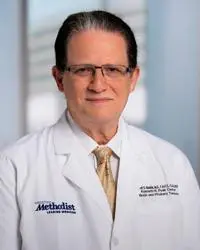Please join the Foundation’s Board in congratulating this year’s Tumor Section winner for the Congress of Neurological Surgeons (CNS) Southeastern Brain Tumor Award, David S. Baskin from Houston Methodist Hospital. His project is entitled “Oncomagnetics: A potential new noninvasive magnetic stimulation technology to treat glioblastoma.”
To read more about the CNS Tumor Section Awards, please visit their website. You can also read about the impact research funded with your generosity has had on the brain tumor community at sbtf.org/impact
David S. Baskin, MD., FACS, FAANS serves as the Director of the Kenneth R. Peak Brain & Pituitary Treatment Center, and oversees the Peak Center Laboratories. He graduated with high honors from Swarthmore College with a B.A. from the Division of Natural Sciences and Engineering. He attended Mt. Sinai School of Medicine, graduated first in his class, and received the James Felt Prize for Overall Academic Achievement. Dr. Baskin began his research career while still a resident at the University of California San Francisco, where he won the Academy Award from the American Academy of Neurosurgery for best research by a resident. After residency, Dr. Baskin was appointed Assistant Professor of Neurological Surgery and Assistant Professor of the Center for Biotechnology at Baylor College of Medicine, with a joint appointment as Chief of Neurological Surgery at the VA Hospital. In 1994 he was promoted to Professor at Baylor College of Medicine in Neurosurgery and Anesthesiology, positions he held until 2005 when his career transitioned to Houston Methodist Hospital.
Dr. Baskin currently serves as Neurosurgery Residency Program Director in the Houston Methodist Neurological Institute, the Vice Chairman of the Department of Neurosurgery, as well as Professor of Neurosurgery at Weill Cornell Medical College, and Research Professor at the University of Houston in both the Cullen College of Engineering’s Department of Electrical and Computer Engineering and the School of Pharmacy.
He performs many complex surgeries in the brain and spine to remove and treat pituitary tumors. He is a master pituitary surgeon, performing more transsphenoidal operations for removal of pituitary tumors than any other neurosurgeon in the country.


